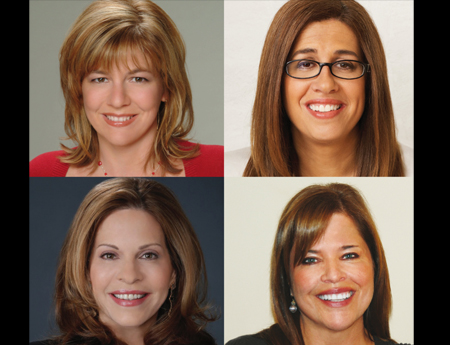In Daytime, Women Run the Show

The smarter way to stay on top of broadcasting and cable industry. Sign up below
You are now subscribed
Your newsletter sign-up was successful
Perhaps more than any segment of the TV industry, syndication—and specifically daytime television—has been made for women by women.
That’s not to say that television syndication and distribution doesn’t have its share of male executives and leaders, but syndication is particularly full of powerful and creative female executive producers—including Ellen’s Mary Connelly, Extra’s Lisa Gregorisch-Dempsey, ET and The Insider’s Linda Bell Blue, Dr. Oz’s Mindy Borman and Amy Chiaro, Queen Latifah’s Corin Nelson, Dr. Phil and The Doctors’ Carla Pennington, Rachael Ray’s Janet Annino and Steve Harvey’s Alex Duda, and many others.
“On the development and programming side, it does seem that there have been more opportunities for women,” says Hilary Estey McLoughlin, CBS Television Distribution’s president of creative affairs, who has worked on talk shows starring Rosie O’Donnell, Tyra Banks and Ellen DeGeneres. “I think women have a better chance of understanding what women want. There are obviously also many talented men producing these shows, but there’s a benefit from having a woman’s perspective on these shows.”
“It’s great when there are women at the helm who have a fundamental understanding of the audience they are trying to reach,” says Holly Jacobs, Sony Pictures Television executive VP of reality and syndicated programming. “It’s much easier and more organic to program for a population that you already know so well.”
Syndication has changed drastically since its go-go days of the ‘80s when Roger and Michael King were selling Wheel of Fortune and Jeopardy!, making piles of money and throwing over-the-top parties at NATPE where they celebrated with their station buyer buddies. With so much consolidation on both the studio and the station side, syndication and distribution is now very much a corporate affair, toning down the wild side of the business.
Concurrently, more women have risen in executive roles, including McLoughlin and Jacobs, as well as executives such as NBCU’s trio of Frances Manfredi, president of NBCUniversal Television and new media distribution; Valerie Schaer, executive VP of creative affairs, NBCU Domestic Television Distribution; and Valari Staab, president of NBC Owned Television Stations; and Disney/ABC’s trio of Janice Marinelli, president, Disney studio global in-home and digital distribution and Disney/ABC North America content distribution; Rebecca Campbell, president of the ABC Owned Television Stations; and Lisa Hackner, executive VP of daytime and syndicated programming.
Serving Daytime’s Changing Viewers
The smarter way to stay on top of broadcasting and cable industry. Sign up below
The daytime audience also has changed— with fragmentation, two-income households and more men staying home to take care of the kids while their wives hold down highpowered jobs—but the daypart’s key demographic remains women age 25-54.
These women are busy, and they have so many choices that to get them to tune in, producers have to give them exactly what they want. And what they want seems to be useful information presented in an entertaining way.
“I think everyone has less time and to a degree, less money. People are really discerning about how they spend their time,” says Janet Annino, executive producer of CTD’s Rachael Ray. “You can’t go too long in a show without something happening, without a pure takeaway. It goes back to people wanting to learn something and feeling like their time and investment was worth it.”
Work Hard, Work Collaboratively
For the most part, the secret to success for women in syndication is much the same as it is for men: hard work, persistence, creativity, collaboration. “I think some of my best management traits come from being female, and from hanging out with my mom and dad,” says Manfredi. “The ability to multitask and make decisions, an emphasis on analytics and problem-solving and a focus on highly inclusive team-building are to me more related to female gender traits than male.”
“As a producer, it’s about your work,” says Annino. “I can’t control how people see me as a woman, but you can control what you do and how hard you work. I always knew no one could outwork me.”
And, just as in the overall workforce, worklife balance remains elusive. “Whether you have children or you don’t, it’s all hard work,” says Jacobs, “and [if you are raising children] you never feel like you are doing either part well. That just comes with the territory. It’s a tricky dance, but I think it’s good for kids to see their parents working and building something.”
Contributing editor Paige Albiniak has been covering the business of television for more than 25 years. She is a longtime contributor to Next TV, Broadcasting + Cable and Multichannel News. She concurrently serves as editorial director for The Global Entertainment Marketing Academy of Arts & Sciences (G.E.M.A.). She has written for such publications as TVNewsCheck, The New York Post, Variety, CBS Watch and more. Albiniak was B+C’s Los Angeles bureau chief from September 2002 to 2004, and an associate editor covering Congress and lobbying for the magazine in Washington, D.C., from January 1997 - September 2002.

